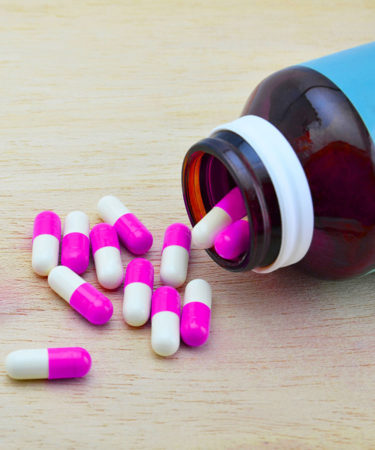We’ve all been there before. You get to work feeling slightly under the weather, promising yourself that you’ll go straight home, make some soup, and plant yourself on the couch for the evening — then someone comes along and invites you to an after-work happy hour. We all know that the fastest way to getting better is to avoid alcohol 100 percent, but avoiding booze altogether can be harder than it seems. We consulted some professional advice on the situation and asked a pharmacist: Which over-the-counter medicines are safe when consuming alcohol?
“Mixing alcohol with medication can be hazardous to your health,” says Tara Kay, a doctor of clinical pharmacy for www.getoffprescriptionmeds.com. “In a perfect world, alcohol and OTC pain meds would not be taken together.” But Kay says that people often combine drinks and OTC meds. It’s important to be aware of the differences between medications. “Alcohol can render some medications less effective and can enhance the effects of other medications,” Kay says. “This can lead to undesired adverse effects.”
Here are the most common OTC medications and how they interact with alcohol:
Acetaminophen
Acetaminophen is the main ingredient in Tylenol, which is also the most popular OTC pain med. Tylenol’s most serious side effect is liver failure, says Kay, and combining alcohol and Tylenol increases your risk of liver damage. “Alcohol and Tylenol in combination also increase the risk of kidney disease compared to either agent alone,” says Kay.
Our conclusion? Hold the booze while taking the T.
Ibuprofen
Ibuprofen is the main ingredient in Advil. It’s a non-steroidal anti-inflammatory drug, also known as an NSAID. It relieves pain, inflammation, and fever. “One of the main side effects of ibuprofen is stomach irritation,” says Kay. “Consuming small amounts of alcohol while taking ibuprofen may not be harmful. However, taking more than the recommended dose of Ibuprofen along with excessive amounts of alcohol may increase the risk for adverse reactions, such as gastrointestinal bleeding and kidney problems.”
Our takeaway? Limit yourself to one small happy hour beverage with the recommended dose of Ibuprofen, then hit the couch.
Naproxen
Naproxen is the main ingredient in Aleve, which is also an NSAID. This means that like Ibuprofen, when combined with alcohol, Naproxen increases the risk of stomach bleeding.
Stomach bleeding? We’ll pass.
Aspirin
Good old-fashioned aspirin combined with alcohol also increases your risk of stomach bleeding. “The combination may also increase impairment levels, as aspirin can increase blood alcohol levels,” says Kay.
Sounds to us like Naproxen, but worse. We’re staying away.
Dr. Kay left us with a solid word of advice: “If you are going to combine OTC pain meds and alcohol, be sure to read package labels carefully,” she recommends. “Take the medication according to the package directions and try to avoid drinking in excess.”
Now that’s a piece of advice we can work with.
